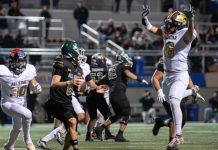The biggest remaining domino wobbled in the afternoon and finally fell in the evening.
When Gordon Hayward announced he was joining the Boston Celtics, it wrapped up the decisions of players at the top of this summer’s NBA free agent board. The biggest moves have been made, but there is more dealing to be done.
The Utah Jazz need to figure out how to move on after losing their leading scorer and another starter Tuesday.
The Cleveland Cavaliers could ponder whether they need another move to counter a fortified Boston team that finished ahead of them in the regular season.
The Miami Heat, the other team that fell short in the Hayward chase, can shop elsewhere with the cash they freed up by finally waiving Chris Bosh.
There aren’t any franchise-altering players left as the NBA heads toward the end of the moratorium Thursday, when stars such as Kevin Durant, Stephen Curry, Blake Griffin and Kyle Lowry can sign the deals they agreed to with their teams.
Hayward was perhaps the top free agent to change addresses, his decision coming in an essay on The Players’ Tribune after it had been reported earlier in the day by ESPN but denied at the time by his agent. Just like Durant’s move from Oklahoma City to Golden State, the word came on the Fourth of July.
The Jazz lost a player Sunday even before Hayward’s decision when George Hill decided to join Sacramento — though it appeared the point guard wouldn’t be back once Utah acquired Ricky Rubio in a trade with Minnesota. That three-year, $57 million deal was one of two additions made Sunday by the Kings, who also got Zach Randolph to leave Memphis for his former coach, Dave Joerger, with a $24 million, two-year agreement.
Also on Sunday, Patrick Patterson agreed to a three-year, $16.4 million contract to leave Toronto for Oklahoma City, where he can inherit one of the forward spots that opened when the Thunder traded Domantas Sabonis to Indiana in the deal to get Paul George, and when Taj Gibson left for Minnesota.
Derrick Rose and Rudy Gay are still on the market, though both are coming off knee injuries. Rajon Rondo also remains available for teams seeking a point guard, and restricted free agents Kentavious Caldwell-Pope and Andre Roberson are strong wing defenders.
Miami could try to keep Dion Waiters and James Johnson now that Hayward won’t be coming, and more teams will flirt with the remaining players who wouldn’t command much money — or even Carmelo Anthony, if he were to become available in New York.
Hayward’s four-year deal worth about $128 million halted the run of Western Conference teams loading up all summer, often at the expense of the weaker East. The trades of George and Jimmy Butler, who went from Chicago to Minnesota, may have sent two 2017 playoff teams into the lottery.
So Hayward’s decision definitely shook things up.
The question now is: How will teams respond?









